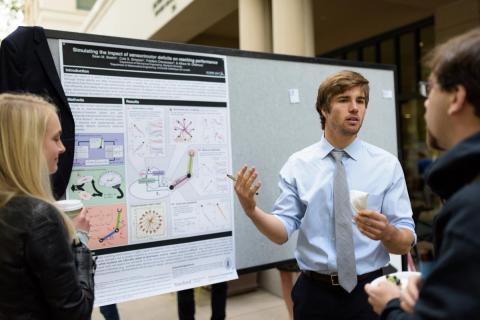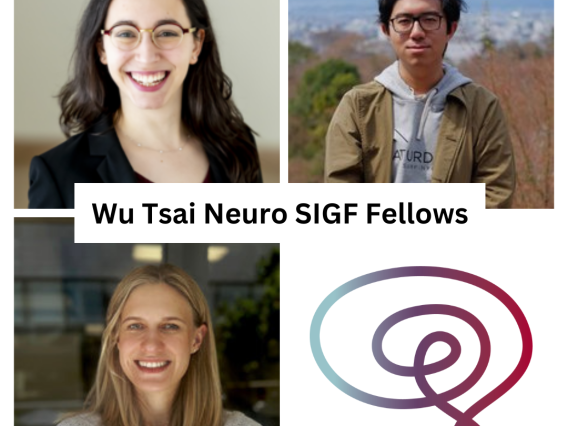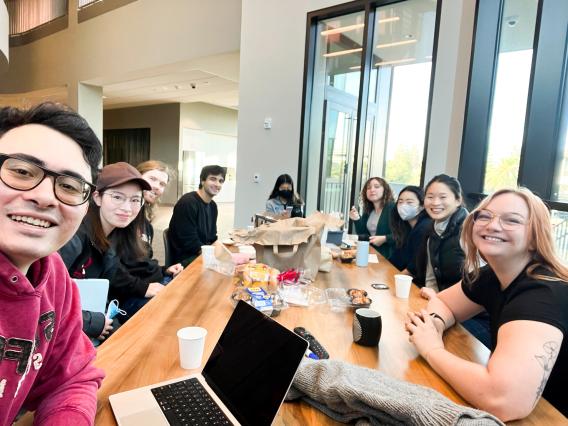Training the next generation of interdisciplinary neuroscientists
The Stanford Interdisciplinary Graduate Fellowship (SIGF) is a competitive, university-wide program that awards three-year fellowships to outstanding doctoral students engaged in interdisciplinary research. Three independent institutes, Bio-X, Wu Tsai Neurosciences Institute, and Sarafan ChEM-H award these graduate fellowships in the biosciences.
The Wu Tsai Neurosciences Institute partners with the Vice Provost for Graduate Education and Stanford BioX to award Stanford Interdisciplinary Graduate Fellowships (SIGFs) in the area of neuroscience. We are grateful to Bio-X and the Bio-X Leadership Council for incorporating the fellowships affiliated with the Institute into their application process.
2024 SIGF Application
All applications submitted through the portal will be considered for fellowships associated with Stanford Bio-X, Wu Tsai Neurosciences Institute, and Sarafan ChEM-H. Students with research especially aligned with the scientific mission of the Wu Tsai Neurosciences Institute graduate fellowships should select "Wu Tsai Neurosciences Institute Fellowship" on their application.
Funded SIGF projects
A principled investigation into the heterogeneous coding properties of medial entorhinal cortex that support accurate spatial navigation
Navigation through an environment to a remembered location is a critical skill we use every day. How does our brain accomplish such a task? Over the last few decades, several lines of evidence have suggested that a brain region called medial entorhinal cortex (MEC) supports navigation by encoding information our location and movement within an environment.
Elucidating mechanisms of microglial tiling
In a process called tiling, homeostatic microglia homogenously organize in a grid-like fashion to achieve efficient surveillance of the brain. The molecular mechanisms underlying tiling are unknown. I hypothesize that microglia use cell-surface proteins to sense density of neighboring microglia, thereby contributing to constant cell-to-cell distances.
Neural mechanisms of learning multiple motor skills and implications for motor rehabilitation
A hallmark of the motor system is its ability to execute different skilled movements as the situation warrants, thanks to the flexibility of motor learning. Despite many behavioral studies on motor learning, the neural mechanisms of motor memory formation and modification remain unclear.
Mechanistic insights into glycerophospholipid metabolism in the lysosome
Phospholipid dysregulation is implicated in the pathogenesis of lysosomal storage disorders (LSDs). We found that glycerophosphodiesters (GPDs) accumulate in lysosomes derived from Batten disease models, a life-limiting LSD whose pathological mechanism remains elusive. GPDs are the degradation products of glycerophospholipid catabolism by phospholipases.
Weak supervision in medical multi-modal time series
The project aims to alleviate this bottleneck by developing a weak supervision system that optimally deals with time-series data and takes advantage of multiple data modalities.
Nanoscale to circuit-level computational and experimental studies of the biophysical mechanism of ultrasound-mediated mechanical neurostimulation
Although ultrasonic neurostimulation has the potential to outperform traditional treatments for many debilitating neurological disorders, it remains unclear how ultrasound affects nervous system activity on the molecular level.
Modeling proprioceptive deficits for the design of novel sensory augmentation for post-stroke movement rehabilitation
Stroke is the main cause of adult disability; 80% of survivors sustain motor (movement) deficits that interfere with activities of daily living. There exists no proven therapeutic strategy for motor recovery of the upper extremity following stroke.
Optimizing computational modeling of traumatic brain injury with machine learning: biomechanics and beyond
Traumatic brain injury (TBI) has become a global health hazard. If undetected, the brain damage of TBI can accumulate, calling for better TBI modeling and warning systems. TBI modeling involves three stages: head impact kinematics, brain deformation, and injuries.




